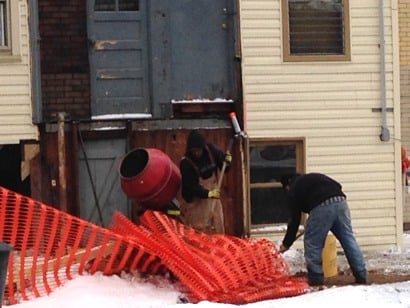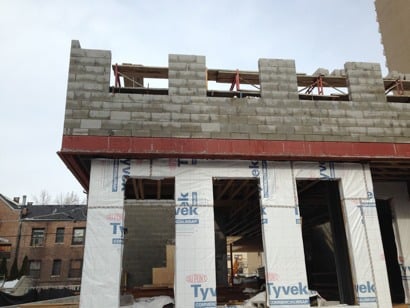Stories From the Field
- Scaffolding Saves the Day (09/20/21)
- Reputation for Honesty & Integrity (07/16/21)
- We Leave Your Masonry Restoration Project Debris Free (06/18/21)
- Window Lintel Replacement Work in East Lakeview (05/28/21)
- An On-going Commitment to Safety (04/24/21)
- AAA-1 Masonry Goes International (04/01/21)
- Quality Work That Will Last For Generations (12/10/20)
- The End of the Work Season Approaches (11/20/20)
- Exceptional Masons Produce Exceptional Masonry Work (09/24/20)
- Changing of the Season (03/08/20)
- The Seasonality of the Masonry Restoration Trades (12/20/19)
- AAA-1 Masonry In A Nutshell (11/20/19)
- No Project Too Big or Too Small (11/08/19)
- What Sets Us Apart (10/19/19)
- Heavy-Duty Vinyl Tarpaulins - An Affordable Means of Stopping Water Infiltration Through Your Masonry Walls (10/01/19)
- Glass Block Windows (06/12/19)
- The Impact of Our Erratic Spring Weather (05/10/19)
- Many (Skilled) Hands Make Light Work (04/19/19)
- Recipient of the 2018 Angie’s List Super Service Award (03/15/19)
- Prohibition-Era Building Materials (01/31/19)
- Recipient of the 2017 Angie’s List Super Service Award (02/01/18)
- Repairing Mortar Joints in Lakeview (08/27/17)
- What's That Haze On My Bricks? (08/15/17)
- Grinding & Tuckpointing (07/14/17)
- Some Thoughts About Safety (#5 in a Series) (03/15/17)
- Masonry Restoration Work & Cold Weather Considerations (#2 in a Series) (02/13/17)
- Masonry Restoration Work & Cold Weather Considerations (#1 in a Series) (01/20/17)
- An Industry In Growing Demand (12/20/16)
- Some Thoughts About Safety (#4 in a Series) (07/28/16)
- "High Quality" Masonry Sealers (06/20/16)
- Personal Protective Equipment (PPE) (05/18/16)
- Chimney Restoration in Hinsdale (04/30/16)
- Ask the Hard Questions (04/16/16)
- Masonry Restoration Case Study (04/06/16)
- Unique Flashing Detail (03/21/16)
- Valentine's Day Truth (02/14/16)
- Happy 30th Anniversary to Frank Kruk! (02/04/16)
- Some Thoughts About Safety (#3 in a Series) (01/20/16)
- Masonry Restoration at Second Church of Christ, Scientist (12/28/15)
- Expression of Gratitude (12/11/15)
- The Importance of Conducting Annual Inspections (11/25/15)
- Proper Site Protection Worth Every Cent (11/05/15)
- Former Dairy Undergoes Masonry Transformation (Part 2) (10/31/15)
- Unusual Brick Discovered (09/30/15)
- New Parapet Wall Project in East Ravenswood (09/16/15)
- Former Dairy Undergoes Masonry Transformation (Part 1) (07/14/15)
- Some Thoughts About Safety (#2 In a Series) (07/02/15)
- Some Thoughts About Safety (#1 In a Series) (06/29/15)
- Enduring Masonry in Oak Park (06/20/15)
- Whatever the Job Requires! (06/15/15)
- Residential Chimney Project in Glencoe (06/02/15)
- AAA-1 Masonry & Tuckpointing is Your Restoration Company (05/09/15)
- Restoring Fourth Presbyterian Church's Historic Fountain (04/06/15)
- Water Leaks – Sound Familiar? (01/15/15)
- Some Thoughts About Safety & Insurance (12/11/14)
- Why Temperature Matters At This Time of Year (11/11/14)
- Kudos to Frank Kruk (09/15/14)
- Counting My Blessings! (07/31/14)
- Your Brick Structure Can Last Another 100+ Years with Preventative Maintenance (07/08/14)
- Masons Are Like Farmers (06/13/14)
- Look Up! (05/28/14)
- Bring Your Child to Work Day (04/24/14)
- AAA-1 Masonry & Tuckpointing Receives BBB's 2013 Complaint-Free Award (02/28/14)
- Heavy Duty Tarps: Effective, Durable Solution for Winter Leaks (02/18/14)
- Why Weather Matters (01/27/14)
- A Few Thoughts About Quality (12/10/13)
- If You Build It Right the First Time... (09/01/12)
- More Common Than You Think (07/06/12)
- Flashing or Through-Wall Flashing (05/05/12)
- Extensive Edison Park Office Project (Underway) (04/24/11)
- Wright Chimney Restoration (03/15/11)
- Lincoln Park Residential Restoration (09/09/10)
- Critical Facade Inspection Work (08/15/10)
- Residential Chimney Rebuild (07/01/10)
- Vehicular Impact With Building (07/20/09)
- Taken For A Ride (06/15/09)
- Chronic Water Damage (05/10/09)
- Brick Wall Repair (11/15/08)
Stories From the Field
Post: Why Weather Matters
Monday January 27, 2014
To date it has been a brutal winter in Chicago. This year, the arctic cold came almost a week before Thanksgiving and has not let up since. I remember the blizzard of 1979 quite clearly, but until this year I had never heard the term "Polar Vortex" nor heard a weatherman report windchills of 50 below zero.
As one of my foremen reminded me recently, 2013 was the shortest work season we've experienced due to inclement weather in the past 32 years (and he would know since he's been working with AAA-1 Masonry since then). Record-breaking spring rains and unending record-breaking cold starting in mid-November have made 2013 a season we are glad to put behind us.
Only a few days remaining in January and the historically cold winter shows no signs of letting up. And yet this week, as I drove the streets of Chicago, the North Shore and Oak Park clearing ice from customers' gutters and performing masonry inspections for 2014 spring work, I saw masons performing restoration work all over the place. In Oak Park, I saw brickwork being performed along the busy commercial stretch of Oak Park Avenue. In Chicago's Wicker Park, new construction projects along Damen Avenue were humming along.
I was aghast. Why? Because masonry work uses water—and lots of it—to make the mortar we use. (For the uninitiated, mortar is the very important glue which bonds together brick, stone, concrete block and terra cotta.) If the mortar freezes while it is curing—and it can take upwards of 4 weeks in cooler weather for mortar to cure completely—its strength, longevity and resistance to wind-driven rain can be compromised... sometimes significantly.
If you think you can cheat Mother Nature by adding accelerants or "season extenders" (which reduce the freezing point of the mortar mix for cold weather use), think again. These additives seriously compromise the quality and longevity of the mortar, and often lead to additional maintenance costs—costs which could be avoided completely if the mason were to respect the temperature restrictions of the mortar. If you hear a supposed mason telling you that it is okay to use mortar additives because everyone does it, you need to consider removing him from your project.
The actual point at which new mortar will freeze depends on a lot of factors, but a failsafe rule of thumb is this: If nighttime temperatures are going to dip more than a couple of degrees below freezing, then the weather is going to have a deleterious effect on your mortar (or on your concrete if you are pouring a foundation). And the colder it gets at night, the worse the impact.
I suppose that if you're a developer building a new residence and offer only a one-year warranty from date of completion on your work, you'll probably avoid a lawsuit from the new owners when, a few years down the road, the mortar begins to fail and the entire structure needs to be ground out, tuckpointed and sealed at a terrific cost. But if you're a mason with even a shred integrity, you know better and will not work with mortar when nighttime temperatures are going to drop more than a degree or two below freezing.

Here are two eager workers getting ready to pour concrete footers for a front porch in the Bowmanville neighborhood of Chicago. (You can see the red cement mixer in the center of the photo and the round yellow sonotube sticking out of the ground just behind the worker on the right.) The temperature was in the upper teens in the middle of the day when this photo was taken, and the evening forecast called for sub-zero temperatures (before accounting for windchill) and 2" - 4" inches of snow. Concrete and mortar require many days to cure properly, and if it freezes during this period it is as good as useless. Would you pay for this work?
The second-story concrete blocks used to build this masonry structure in East Lake View are frozen solid. (The dark patches are frozen water.) The home builders failed to wrap or heat the site. The daytime temperature was 12 degrees when this photo was taken; I wonder how much colder it got at night?!
But don't worry about the structurally compromised concrete block walls... you won't be able to see them after the builder throws the facade up over it!
Masonry work is being performed all over Chicago in these inappropriate weather conditions (it is unethical—but not illegal—to build in the dead of winter). The result is poorly constructed housing stock unable to withstand wind-driven rain and in need of increased and more costly maintenance.

